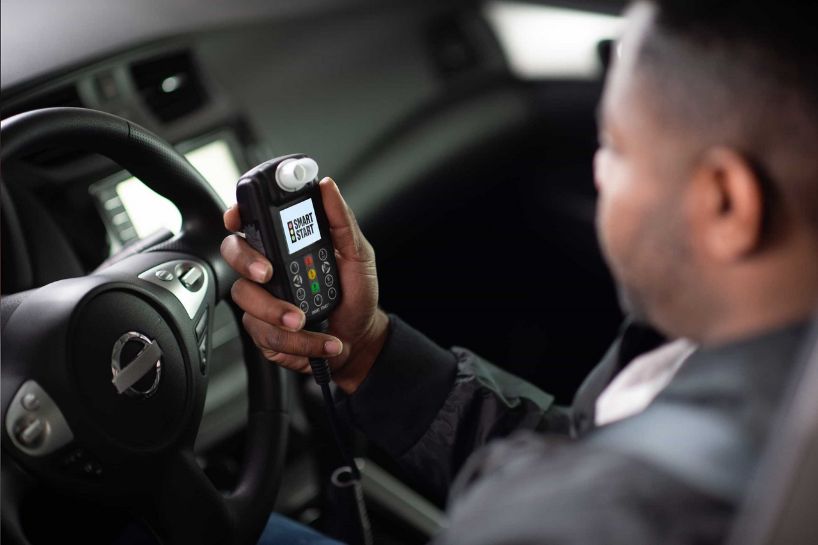If you are convicted of certain alcohol-related offences, you will likely be subject to a “mandatory interlock order”. If a mandatory interlock order is made, you will be required to participate in the Alcohol Interlock Program, which prohibits you from driving unless you have an interlock device installed on your vehicle for a period of time.
What is an interlock device?
An interlock device is an electronic breath-testing device that, when installed, is linked to the ignition of your motor vehicle.
The interlock device works by requiring you to provide a breath sample prior to starting your vehicle. The interlock device will prevent the vehicle from starting if it detects any alcohol in your system. The interlock device will also conduct random breath tests throughout your journey.
Whenever a breath sample is provided, you must be seated in the driver’s seat of the vehicle, as an image is captured by the interlock system camera. An image is captured by the device so that a person cannot circumvent the interlock system by having another person blow into the device for them.
An interlock device requires monthly servicing and calibration by a qualified technician.
Parliament introduced the interlock program to “help offenders learn how to separate their drinking from their driving“. Parliament also noted that interlock programs enable individuals to “continue to access employment and essential services for their families. By providing a strictly monitored way back into licensing, interlock programs reduce the chance that offenders will drive unlicensed, and potentially under the influence, while disqualified“.[1]
What is a mandatory interlock order?
A mandatory interlock order is an order made by a court that:[2]
- disqualifies a person convicted of certain offences from holding any driver licence for a period; and
- disqualifies that person from holding a driver licence for 5 years from the date of the conviction unless the person has first held an interlock driver licence for a specified period of time.
You will have your licence disqualified for a period prior to the issue of an interlock driver licence. You will then be required to hold an interlock driver licence for a prescribed period of time. The interlock scheme, however, allows you to return to driving earlier than otherwise would have been the case without the option of an interlock licence.
When is an interlock order made?
An interlock order is made if you are convicted of a “mandatory interlock offence”. Therefore, if you avoid a conviction, either by being found not guilty or by obtaining a section 10(1)(a) dismissal or 10(1)(b)-(c) conditional dismissal, you will not be required to participate in the interlock program.
How long do you need to have an interlock licence for?
Different “mandatory interlock offences” carry different disqualification periods and minimum interlock periods. For example, if the holder of an unrestricted driver licence is convicted of a mid-range prescribed concentration of alcohol offence (that is, they produce a blood alcohol concentration reading between 0.08 and 0.149), and if that is the first time they have been convicted of drink driving, the offence carries a minimum disqualification period of 1 month and a maximum disqualification period of 3 months. Following the disqualification, the offender will then be required to have an interlock device fitted to their case for a minimum period of 12 months.[3]
In contrast, a holder of an unrestricted driver licence who is convicted of the same offence, but who has a previous alcohol-related offence within 5 years of the offence, will be subject to a minimum disqualification period of 6 months, a maximum disqualification period of 9 months, and a minimum interlock period of 24 months.
Cost of the interlock device
If you are required to instal in your vehicle a interlock device, you will be liable for the cost of installing, servicing and removing the interlock device from the vehicle.
The costs associated with an interlock device vary depending on the provider, but you should expect to spend at least $2,000 a year for installing and servicing the device.
Alternatives to interlock orders?
In rare circumstances, a court may make an interlock exemption order that exempts an offender from the mandatory interlock orders.[4] A court will only make an exemption order if:
- the offender does not have access to a vehicle in which to install an interlock device; or
- the offender has a medical condition diagnosed by a registered medical practitioner that prevents the offender from providing a sufficient breath sample to operate an interlock device and it is not reasonably practicable for an interlock device to be modified to enable the offender to operate the device; or
- if the offence is a mid range PCA (first offence) or combined mid range PCA and drug driving (first offence):
- the making of a mandatory interlock order would cause severe hardship to the offender; and
- the making of an exemption order is more appropriate in the circumstances.
How we can help
At Hunt & Hunt, our team has experience in both prosecuting and defending alcohol-related offences that lead to mandatory interlock orders.
Our team will assist you with:
- opposing the making of a conviction against you for the alcohol-related offence;
- if applicable, minimising the disqualification periods that precede the installation of an interlock licence;
- if applicable, minimising the interlock period;
- if applicable, obtaining an exemption order; and
- advocating on your behalf, both in court and in discussions with the prosecuting authority.
If you require our advice or assistance, please do not hesitate to get in touch.
By: Jeremy Bodon, Associate.
[1] Second Reading Speech to the Road Transport Amendments (Mandatory Alcohol Interlock Program) Bill 2014.
[2] S 211(1) Road Transport Act 2017 (NSW).
[3] Ibid s 211.
[4] Ibid s 212.


































